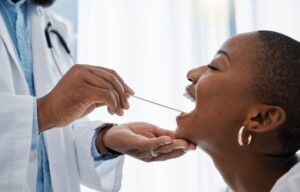
Oral cancer is a serious condition that affects thousands of people each year. While it may not receive as much public attention as other types of cancer, it can be just as life-altering, especially if not detected early. Understanding your risk factors is one of the best ways to protect yourself and take charge of your oral health. So, the question is: are you at risk for oral cancer? Let’s explore the major risk factors, warning signs, and steps you can take to reduce your chances of developing this potentially life-threatening disease.
Understanding Oral Cancer
Oral cancer can develop in the lips, tongue, cheeks, gums, the floor or roof of the mouth, or the throat. It typically begins as a small sore or lesion that doesn’t heal, but it can spread quickly if not caught early. The earlier oral cancer is diagnosed, the more successful treatment is likely to be.
Common Risk Factors
Several factors can increase your risk of developing oral cancer. Some are lifestyle-related, while others are genetic or health-based. Below are some of the most common.
Tobacco Use
Smoking cigarettes, cigars, or pipes, and using smokeless tobacco like chewing tobacco or snuff, greatly increases your risk of oral cancer. Tobacco is one of the leading causes of mouth, throat, and tongue cancers.
Alcohol Consumption
Heavy drinking, especially when combined with tobacco use, compounds your risk significantly. Alcohol can irritate the cells in your mouth and throat, making them more susceptible to cancer-causing agents.
Human Papillomavirus (HPV)
Certain strains of HPV, especially HPV-16, have been linked to oropharyngeal cancers (cancers in the back of the throat, including the base of the tongue and tonsils). The good news is that the HPV vaccine can reduce this risk.
Age and Gender
Oral cancer is more common in people over 45 and affects men twice as often as women. However, cases in younger individuals, often linked to HPV, are on the rise.
Sun Exposure
Frequent, unprotected exposure to the sun increases the risk of lip cancer, particularly in fair-skinned individuals.
Poor Oral Hygiene and Diet
A diet low in fruits and vegetables, along with poor oral hygiene, may contribute to a higher risk of developing oral cancer. Chronic irritation from rough teeth, broken fillings, or ill-fitting dentures can also play a role.
Warning Signs to Watch For
Being aware of early symptoms can help you catch problems before they become serious. Watch for:
- A sore that doesn’t heal.
- Red or white patches in the mouth.
- Lumps, thickening, or rough spots.
- Difficulty chewing, swallowing, or speaking.
- Numbness or pain in the mouth or lips.
If you notice any of these symptoms lasting more than two weeks, see your dentist or doctor right away.
Oral cancer can affect anyone, but being aware of your risk factors and taking steps to reduce them can help protect your health. If you use tobacco or alcohol, have a history of HPV, or notice any unusual changes in your mouth, don’t ignore the signs. Regular dental checkups are crucial, as dentists are often the first to detect early signs of oral cancer. Early detection truly can save lives.
About the Practice
Are you in need of a routine checkup and cleaning? Whether it’s been years or you’re right on schedule with your appointments, Pleasant Grove Family Dentistry can provide you with preventive dentistry that includes an oral cancer screening. Early detection is key to potential complications, so if you’re ready for your next dental visit, schedule an appointment with us online or call our Texarkana office at (903) 838-9700.
